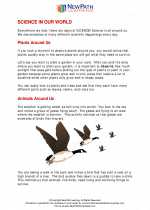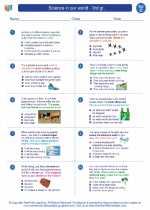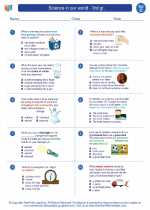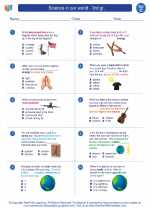Effect in Science
In science, the term "effect" refers to the result or consequence of a particular cause or action. It is an important concept in understanding how various factors interact and produce observable outcomes in the natural world.
Types of Effects
There are several types of effects that can be observed in science:
- Direct Effect: This occurs when a cause directly produces a specific outcome without any intermediate steps.
- Indirect Effect: This occurs when a cause leads to an outcome through a series of intermediate steps or processes.
- Positive Effect: This refers to a result that enhances or promotes a particular condition or process.
- Negative Effect: This refers to a result that inhibits or hinders a particular condition or process.
Examples of Effects
Here are some examples of effects in science:
- Effect of Heat on Ice: When heat is applied to ice, it melts and turns into water.
- Effect of Light on Plant Growth: Plants require light for the process of photosynthesis, which is essential for their growth and development.
- Effect of Gravity on Objects: Gravity causes objects to fall to the ground when released from a height.
Study Guide
To better understand the concept of effect in science, consider the following study guide:
- Define the term "effect" and provide examples of different types of effects.
- Identify and describe at least three cause-and-effect relationships in nature or everyday life.
- Explain how the concept of effect is related to the scientific method and the process of experimentation.
- Discuss the potential positive and negative effects of human activities on the environment.
- Conduct an experiment to demonstrate a cause-and-effect relationship and analyze the observed effects.
By studying the concept of effect in science, you can gain a deeper understanding of the interconnectedness of natural phenomena and the importance of identifying causal relationships in scientific inquiry.
[Effect] Related Worksheets and Study Guides:
.◂Science Worksheets and Study Guides Third Grade. Science in our world - 3rd gr.
Study Guide Science in our world - 3rd gr.
Science in our world - 3rd gr.  Worksheet/Answer key
Worksheet/Answer key Science in our world - 3rd gr.
Science in our world - 3rd gr.  Worksheet/Answer key
Worksheet/Answer key Science in our world - 3rd gr.
Science in our world - 3rd gr.  Worksheet/Answer key
Worksheet/Answer key Science in our world - 3rd gr.
Science in our world - 3rd gr.  Worksheet/Answer key
Worksheet/Answer key Documenting Data
Documenting Data 

 Worksheet/Answer key
Worksheet/Answer key
 Worksheet/Answer key
Worksheet/Answer key
 Worksheet/Answer key
Worksheet/Answer key
 Worksheet/Answer key
Worksheet/Answer key

The resources above cover the following skills:
History and Nature of Science: A student should understand the history and nature of science. A student who meets the content standard should:
Develop an understanding that historical perspectives of scientific explanations demonstrate that scientific knowledge changes over time, building on prior knowledge.
Develop an understanding that scientific knowledge is ongoing and subject to change as new evidence becomes available through experimental and/or observational confirmation(s).